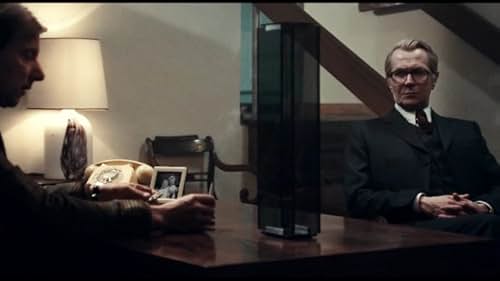Tinker Tailor Soldier Spy (2011)

inker Tailor Soldier Spy (2011): A Masterclass in Espionage and Suspense
Introduction
Tinker Tailor Soldier Spy (2011), directed by Tomas Alfredson, is a meticulously crafted adaptation of John le Carré’s iconic Cold War spy novel. With a stellar ensemble cast featuring Gary Oldman, Colin Firth, Tom Hardy, Benedict Cumberbatch, and Mark Strong, the film delves deep into the shadowy world of espionage. It’s a cerebral thriller, eschewing high-octane action for a slow-burn narrative filled with intrigue, deception, and psychological complexity. Nominated for three Academy Awards, including Best Actor for Gary Oldman, the film is a modern masterpiece of the spy genre.
Plot Summary
Set in the 1970s during the height of the Cold War, the story follows George Smiley (Gary Oldman), a retired British intelligence officer from MI6, known in espionage circles as “the Circus.” After a botched mission in Hungary results in the dismissal of the agency’s leader, Control (John Hurt), Smiley is forced into retirement. However, when suspicions arise that a Soviet mole has infiltrated the highest levels of British intelligence, Smiley is covertly brought back to investigate.
Smiley methodically uncovers clues that lead to a network of lies, betrayals, and double agents within the Circus. The suspects are narrowed down to four high-ranking officials, codenamed Tinker (Percy Alleline, played by Toby Jones), Tailor (Bill Haydon, played by Colin Firth), Soldier (Roy Bland, played by Ciarán Hinds), and Poor Man (Toby Esterhase, played by David Dencik). Each is a trusted member of the team, and Smiley must navigate a maze of loyalty and deceit to uncover the truth.
Smiley’s investigation takes him through a labyrinth of secrets, from the defection of a Soviet spy (Tom Hardy as Ricki Tarr) to the traumatic memories of past failures. As he pieces together the puzzle, the tension builds to a dramatic confrontation, where the true identity of the mole is revealed, shaking the foundation of British intelligence.
Themes
The film explores themes of loyalty and betrayal, showing how the Cold War’s pervasive mistrust infiltrates personal and professional relationships. It examines the psychological toll of espionage, portraying spies not as glamorous heroes but as flawed individuals burdened by moral compromises. Power and corruption within institutions are central to the story, revealing how ambition can blind people to treachery. The narrative delves into the idea of identity and how living a double life can erode one’s sense of self.
Performances and Characters
Gary Oldman delivers a career-defining performance as George Smiley, portraying him as a reserved yet deeply insightful man. With minimal dialogue and subtle expressions, Oldman captures Smiley’s razor-sharp intellect and quiet determination, proving that restraint can be as compelling as flamboyance.
Colin Firth as Bill Haydon exudes charm and sophistication, masking the complexity of his character’s motivations. Tom Hardy as Ricki Tarr brings a raw energy to his role as a disillusioned field agent, while Benedict Cumberbatch as Peter Guillam adds emotional depth as Smiley’s loyal aide. Mark Strong as Jim Prideaux delivers a haunting portrayal of a man scarred by betrayal and failure. The entire cast, down to the smallest roles, enhances the film’s authenticity and emotional resonance.
Direction and Cinematic Style
Tomas Alfredson’s direction emphasizes mood and atmosphere, creating a sense of paranoia and unease that permeates every frame. The film’s visual style is marked by muted colors, dimly lit interiors, and meticulous period detail, immersing viewers in the bleak and shadowy world of Cold War espionage. The pacing is

deliberately slow, allowing tension to build gradually as the pieces of the puzzle fall into place.
The use of silence and minimalistic dialogue adds to the film’s intensity, forcing viewers to focus on every glance, gesture, and subtle interaction. The cinematography by Hoyte van Hoytema captures the drab yet menacing aesthetic of the 1970s, with tight framing that mirrors the claustrophobic nature of the spy world.
Music and Sound Design
Alberto Iglesias’ haunting score underscores the film’s somber tone, blending melancholy strings with subtle, ominous undertones. The music complements the story’s emotional weight, enhancing the tension without overwhelming the narrative. The sound design is equally precise, with every creak of a door, shuffle of papers, and hushed conversation adding to the film’s immersive atmosphere.
Reception and Legacy
Tinker Tailor Soldier Spy received widespread critical acclaim, praised for its intelligent storytelling, impeccable performances, and atmospheric direction. While some viewers found its complex plot challenging, fans of the spy genre appreciated its fidelity to John le Carré’s novel and its refusal to oversimplify.
Gary Oldman’s portrayal of Smiley was hailed as a masterclass in understated acting, earning him an Oscar nomination for Best Actor. The film’s meticulous attention to detail and nuanced approach to espionage have cemented its status as a modern classic.
Memorable Moments and Quotes
The chilling opening scene in Hungary, where a mission goes disastrously wrong, sets the stage for the story’s high stakes. Smiley’s silent yet emotionally charged confrontation with the mole is a masterstroke of restrained tension. Ricki Tarr’s impassioned confession about betrayal and disillusionment is both gripping and poignant. The iconic line, “Trust is a luxury we can’t afford,” encapsulates the film’s central theme of paranoia.
Conclusion
Tinker Tailor Soldier Spy is a masterful exploration of the shadowy world of espionage, offering a compelling blend of intrigue, psychological complexity, and emotional depth. With its stellar cast, meticulous direction, and richly textured narrative, the film transcends the spy genre to become a profound meditation on trust, loyalty, and the human cost of betrayal. For fans of intelligent, character-driven thrillers, this film is an essential viewing experience that lingers long after the credits roll.











